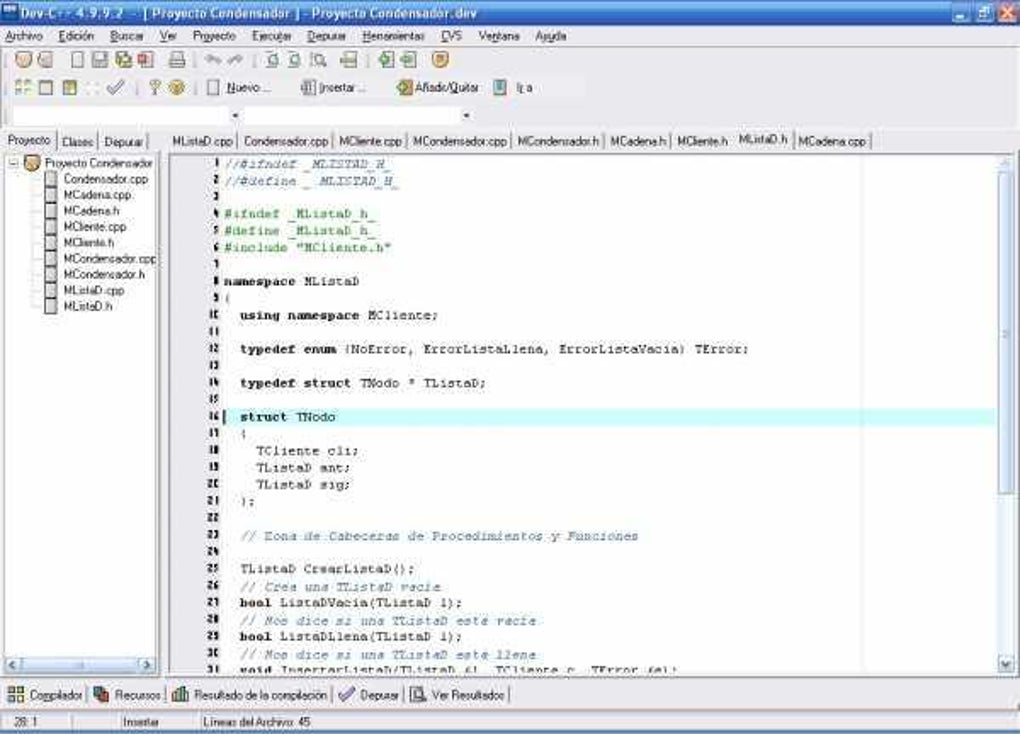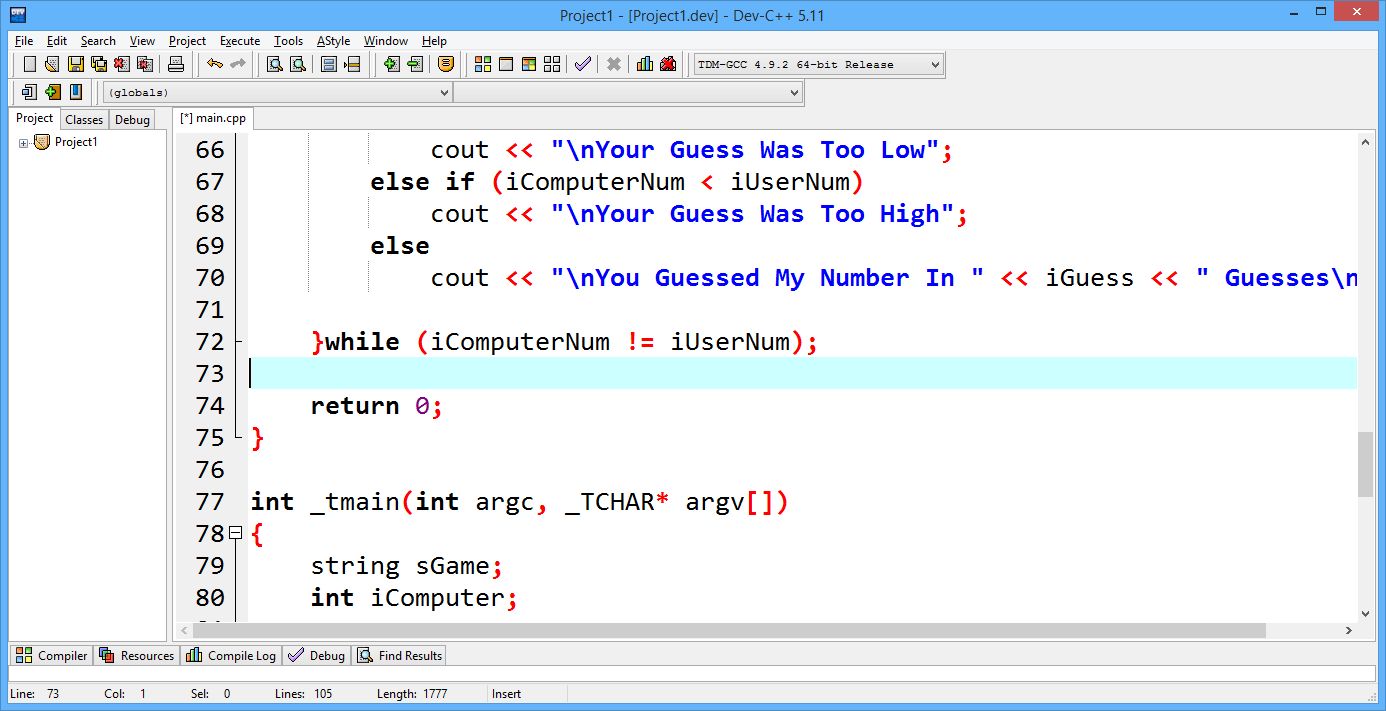Dev-C++ showing its updated UI and new variable browsing options | |
| Developer(s) | Bloodshed Software until 2005, Orwell (Johan Mes) since 2011 |
|---|---|
| Stable release | |
| Repository | |
| Written in | Delphi |
| Operating system | Microsoft Windows, Linux (alpha only) |
| Type | Integrated development environment |
| License | GNU General Public License |
| Website | orwelldevcpp.blogspot.com www.bloodshed.net at the Wayback Machine (archived March 20, 2016) |
| Usage | |
Dev-C++ is a free full-featured integrated development environment (IDE) distributed under the GNU General Public License for programming in C and C++. It is written in Delphi.
It is bundled with, and uses, the MinGW or TDM-GCC 64bit port of the GCC as its compiler. Dev-C++ can also be used in combination with Cygwin or any other GCC-based compiler.[1]
Dev-C is an integrated development environment (IDE) for the C programming language. It presents a feature-rich environment, tools for writing and debugging, as well as a compiler to provide you with all the tools necessary to program software in C. The program is a fork of the Bloodshed Dev-C environment, designed for advanced. Even though DEV-C is filled with advanced compiler, debugger and a wide array of dev tools, it’s installation package is quite small (only around 50 MB) and therefore can be easily installed on any modern Windows PC or laptop. Just follow the onscreen instructions, and in mere seconds DEV C plus plus will be ready for running.
Don't use Dev-C? Nord lead vst free download. Other than that, I guess check that all the paths in the console output are valid. But really, don't use Dev-C. – Seth Carnegie Jun 7 '11 at 5:28. Dev-C is a free full-featured integrated development environment (IDE) distributed under the GNU General Public License for programming in C and C. It is written in Delphi. It is bundled with, and uses, the MinGW or TDM-GCC 64bit port of the GCC as its compiler. Dev-C can also be used in combination with Cygwin or any other GCC-based.
Dev-C++ is generally considered a Windows-only program, but there are attempts to create a Linux version: header files and path delimiters are switchable between platforms.
- Dev-C Bloodshed Dev-C is a full-featured Integrated Development Environment (IDE) for the C/C programming language. It uses Mingw port of GCC (GNU Compiler Collection) as it's compiler. Dev-C can also be used in combination with Cygwin or any other GCC based compiler. Free Software (GPL) For Windows 95, 98, NT, 2000, XP.
- Mingw32 Alternate C Runtime Library: The Mingw32 Alternate C Runtime Library is being developed as a replacement for the Microsoft C Runtime Library (MSVCRT.DLL) because there is a need for a C Runtime Library for Mingw32 users which is not dependent on the Microsoft C Runtime Library, open-source, not licensed under the GPL or LGPL, and can be used freely for commercial use.
Devpaks[edit]
An additional aspect of Dev-C++ is its use of DevPaks: packaged extensions on the programming environment with additional libraries, templates, and utilities. DevPaks often contain, but are not limited to, GUI utilities, including popular toolkits such as GTK+, wxWidgets, and FLTK. Other DevPaks include libraries for more advanced function use. Users of Dev-C++ can download additional libraries, or packages of code that increase the scope and functionality of Dev-C++, such as graphics, compression, animation, sound support and many more. Users can create Devpaks and host them for free on the site. Also, they are not limited to use with Dev-C++ - the site says 'A typical devpak will work with any MinGW distribution (with any IDE for MinGW)'.
Development status[edit]
From February 22, 2005 to June 2011 the project was not noticeably active, with no news posted nor any updated versions released. In a 2006 forum post, lead developer Colin Laplace stated that he was busy with real-life issues and did not have time to continue development of Dev-C++.[2]

There are two forks of Dev-C++ since then: wxDev-C++ and the Orwell version.
wxDev-C++ is a development team that has taken Dev-C++ and added new features such as support for multiple compilers and a RAD designer for wxWidgets applications.
On June 30, 2011 an unofficial version 4.9.9.3 of Dev-C++ was released by Orwell (Johan Mes), an independent programmer,[3] featuring the more recent GCC 4.5.2 compiler, Windows' SDK resources (Win32 and D3D), numerous bugfixes, and improved stability. On August 27, after five years of officially being in a beta stage, version 5.0 was released.[4] This version also has its own separate SourceForge[5] page since version 5.0.0.5, because the old developer isn't responding to combining requests. On July 2014, Orwell Dev-C++ 5.7.1 was released featuring the more recent GCC 4.8.1 which supports C++11.
Notable uses[edit]
On May 4, 2015, The Singapore Prime Minister Lee Hsien Loong posted his Sudoku solver program in C++ on Facebook. In his screen shot, he's using Microsoft Windows and Dev-C++ as his IDE.[6]
See also[edit]
References[edit]
- ^'Bloodshed Software - Providing Free Software to the internet community'. bloodshed.net. Retrieved 8 September 2015.
- ^'Dev-C++'. sourceforge.net. Retrieved 8 September 2015.
- ^Orwell. 'Dev-C++ Blog'. orwelldevcpp.blogspot.com. Retrieved 8 September 2015.
- ^Orwell. 'Dev-C++ Blog'. orwelldevcpp.blogspot.com. Retrieved 8 September 2015.
- ^orwelldevcpp. 'Dev-C++'. SourceForge. Retrieved 8 September 2015.
- ^'Prime Minister of Singapore shares his C++ code for Sudoku solver'. Ars Technica. Retrieved 8 September 2015.
External links[edit]
- Official website
- Dev-C++ on SourceForge.net
- Dev-C++ Portable on SourceForge.net
Feature list
- Support GCC-based compilers
- Integrated debugging (using GDB)
- Support for multiple languages (localization)
- Class Browser
- Code Completion
- Debug variable Browser
- Project Manager
- Customizable syntax highlighting editor
- Quickly create Windows, console, static libraries and DLLs
- Support of templates for creating your own project types
- Makefile creation
- Edit and compile Resource files
- Tool Manager
- Print support
- Find and replace facilities
- Package manager, for easy installation of add-on libraries
- CVS Support
- To-Do List
- CPU Window
Requirements
Bloodshed C++ Compiler
|
License
Dev-C++ is Free Software distributed under the GNU General Public License.
This means you are free to distribute and modify Dev-C++, unlike most Windows software! Be sure the read the license.
Donations
Please support Dev-C++ by making a donation ! The money will be shared between the active developers and the support manager in order to help us continue improving Dev-C++ from day to day.
Click on the button below to make a donation using Paypal or your Credit Card :
Downloads

| Dev-C++ 5.0 beta 9.2 (4.9.9.2) (9.0 MB) with Mingw/GCC 3.4.2 Dev-C++ version 4.9.9.2, includes full Mingw compiler system with GCC 3.4.2 and GDB 5.2.1 See NEWS.txt for changes in this release. Download from: |
| Dev-C++ 5.0 beta 9.2 (4.9.9.2), executable only (2.4 MB) Dev-C++ version 4.9.9.2, without Mingw compiler system and GDB. Get this one if you already have a previous Dev-C++ beta or already a compiler. See NEWS.txt for changes in this release. Download from: |
| Dev-C++ 5.0 beta 9.2 (4.9.9.2), source code (1.6 MB) Dev-C++ version 4.9.9.2 source code for Delphi. Download from: |
Dev-C++ 4
Yes, Dev-C++ 4 is still available. There are the downloads:
Binaries:
Source code:
Developers information
The SourceForge project page is located here. The bleeding edge source code is located at the SourceForge CVS.
Bloodshed Dev C++ Compiler Free Download
- Source code for Dev-C++ 5: CVS repository
In order to compile it, you'll need Borland Delphi 6. - Mingw source code:http://www.mingw.org/